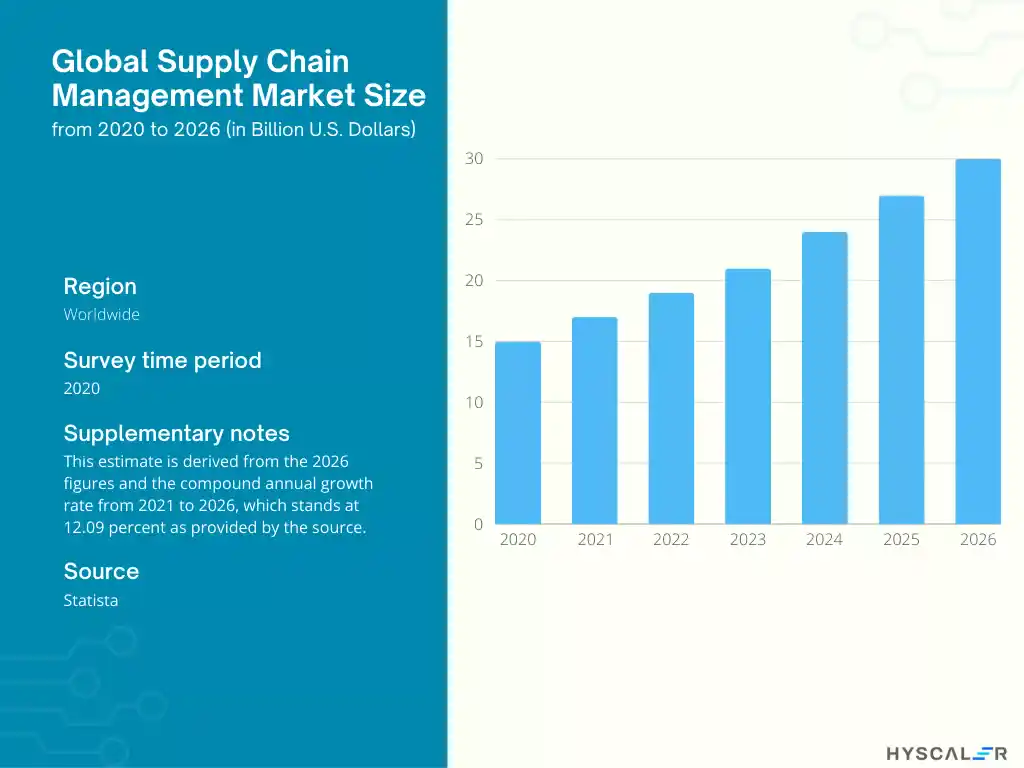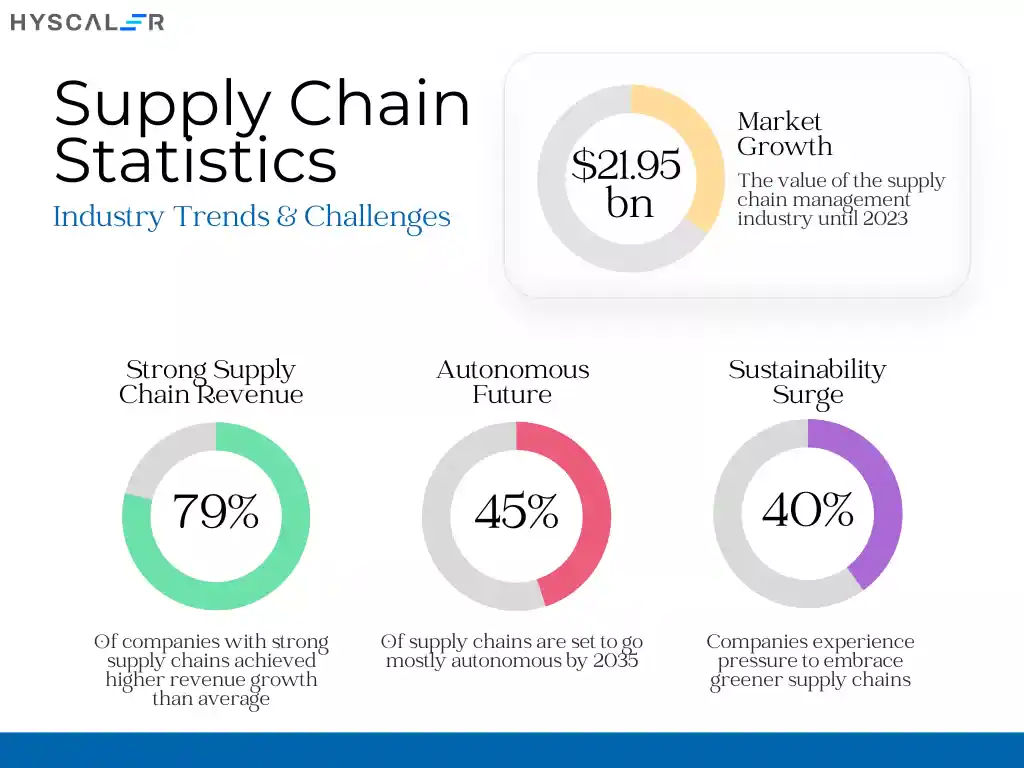Table of Contents
The global supply chain management market is expected to grow from $15.85 billion in 2020 to nearly $31 billion by 2026, highlighting the critical importance of effective Supply Chain Management Services for businesses. In this dynamic landscape, organizations must adapt to maintain a competitive edge.
In today’s fast-paced business environment, effective Supply Chain Management (SCM) has become a critical component for organizations to maintain a competitive edge, reduce costs, and improve customer satisfaction. SCM is the process of coordinating and managing the flow of goods, services, and information from suppliers to customers. As businesses have become more globalized and complex, the need for a more integrated and collaborative approach to SCM has emerged.
The Evolution of Supply Chain Management
Traditional supply chain models focused on individual functions, such as procurement, production, and distribution. However, the landscape has evolved significantly, driven by key factors:

- Increased Competition and Customer Demands: Businesses face intense competition and rising customer expectations, requiring more agile and responsive supply chains.
- Advancements in Technology and Data Analytics: The adoption of technologies like the Internet of Things (IoT), Artificial Intelligence (AI), and blockchain is transforming SCM, enabling data-driven decision-making and automation.
- Emphasis on Sustainability and Ethical Practices: There is a growing focus on environmental and social responsibility in SCM, with circular economy models and sustainable sourcing becoming more prevalent.
- Globalization and the Need for Agility and Resilience: Navigating global supply chains requires a balance between localization and globalization, as organizations seek to reduce risk and improve responsiveness.
Emerging Trends in Supply Chain Management
Digital Transformation: The integration of digital technologies is revolutionizing SCM. Data-driven decision-making, automation, and the use of advanced analytics are enabling optimization and improved efficiency.
Sustainability and Ethical Practices: Businesses are increasingly prioritizing environmental and social responsibility in their supply chain operations. Circular economy models, sustainable sourcing, and reverse logistics are gaining traction.
Agility and Resilience: Supply chains must be able to adapt quickly to disruptions and uncertainties. Flexible supply chain networks, risk management strategies, and the ability to respond to changing market conditions are essential.
Globalization and Localization: Navigating global supply chains requires a balance between localization and globalization. Regionalization and nearshoring are becoming more common as organizations seek to reduce risk and improve responsiveness.
Talent and Skill Development: As SCM becomes more data-driven and technology-focused, there is a growing need for upskilling supply chain professionals. Interdisciplinary collaboration and a data-driven mindset are crucial for success in the modern supply chain landscape.
Challenges and Considerations in SCM Development
1. Technological Integration and Data Management
Integrating disparate systems and managing large volumes of data are significant challenges in SCM development. Ensuring data accuracy, security, and accessibility is crucial.
2. Regulatory Compliance and Governance
Organizations must navigate a complex web of regulations and standards related to SCM, such as environmental regulations, trade agreements, and industry-specific requirements.
3. Collaboration and Communication Across the Supply Chain
Effective collaboration and communication between all stakeholders in the supply chain, including suppliers, logistics providers, and customers, are essential for success.
4. Talent Acquisition and Retention
As demand for skilled supply chain professionals increases, organizations must focus on attracting and retaining top talent with the necessary skills and expertise.
Strategies for Effective Supply Chain Management Development
- Adopt a Holistic Approach: Align SCM with overall business strategy and integrate cross-functional collaboration. Ensure that SCM is not siloed but is integrated into the broader organizational objectives.
- Leverage Digital Technologies: Implement smart supply chain solutions that leverage technologies like IoT, AI, and blockchain. Utilize data analytics to drive informed decision-making and continuous improvement.
- Foster Sustainability and Resilience: Implement sustainable practices throughout the supply chain, from sourcing to logistics. Build agile and adaptable supply chains that can withstand disruptions and uncertainties.
- Invest in Talent and Skill Development: Upskill existing supply chain professionals and attract new talent with the necessary skills in areas such as data analysis, technology integration, and cross-functional collaboration.
- Embrace Continuous Improvement: Regularly review and optimize supply chain processes, implement performance measurement and feedback loops, and foster a culture of continuous improvement.
Embracing the Future of Supply Chain Management
- Market Growth: The supply chain management market has steadily grown from $15.85 billion in 2020 to $21.95 billion in 2023, and is expected to reach $30.91 billion by 2026.
- Revenue Growth: A Deloitte survey found that 79% of retail and manufacturing companies with highly efficient supply chains saw substantially better revenue growth than the average, while only 8% of businesses with problematic supply chains experienced better-than-average revenue growth.
- Supply Chain Visibility: A McKinsey survey revealed that 45% of businesses either have no visibility into their upstream supply chain or can see only as far as their first-tier suppliers, leading to disruptions and inefficiencies.
- Top Supply Chain Challenges: According to MHI’s Annual Industry Report, the top supply chain challenges in 2023 are hiring and training, labor shortages, and supply chain disruptions, followed by out-of-stock situations and consumer demands for customization.
- Cybersecurity Concerns: A BCI survey found that 55.6% of businesses’ main concern for future supply chain resilience is cyber-attacks and data breaches, followed by adverse weather, natural disasters, and energy scarcity.
- Sustainability Pressure: 48% of companies face pressure to adopt more sustainable practices in their supply chains, aligning with the global push for greener operations.
- Sustainability Focus Areas: The top areas that businesses report prioritizing for supply chain sustainability are electrification (40%), natural resource management (29%), and water usage and the transition to renewables (both at 27%).
- Customer Experience Focus: According to Gartner, 83% of businesses are developing customer-centric supply chains by emphasizing customer service, differentiated services, and varied fulfillment options.
- COVID-19 Impact: The COVID-19 pandemic took a significant toll on US small businesses, with 38.8% reporting supply chain delays, with the highest impact on manufacturing (64.6%), retail (59.8%), and construction (58.5%).
- Causes of Disruptions: The main causes of supply chain disruptions during 2022 were loss of talent/skills, human illness, and transport network issues, followed by adverse weather conditions and cyber attacks/data breaches.

The global supply chain management market is poised for significant growth, expected to reach nearly $31 billion by 2026. This rapid expansion underscores the critical importance of effective supply chain management for businesses of all sizes and industries. As the landscape continues to evolve, organizations must be proactive in adapting their strategies to maintain a competitive edge.By embracing emerging trends in supply chain management, such as digital transformation, sustainability, and talent development, organizations can unlock new opportunities for growth and efficiency. Leveraging advanced technologies, fostering agility and resilience, and investing in their workforce will be key to navigating the complexities of modern supply chains.
However, the path forward is not without its challenges. Addressing integration, compliance, and collaboration issues will require a concerted effort from supply chain leaders. By implementing the strategies outlined in this blog, organizations can develop resilient, sustainable, and high-performing supply chains. The future of supply chain management is bright, but it will require a proactive and innovative approach. If your organization is ready to optimize its supply chain, we encourage you to reach out to our team of experts. Our comprehensive supply chain management services can help you navigate the evolving landscape and position your business for long-term success.
Contact us today to learn more.





